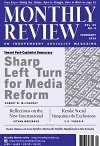Volume 65, Issue 09 (February)

A comparison of the present state of the natural sciences with that of the social (or human) sciences cannot but give rise to a disquieting sense of the relative poverty of the latter. Although natural scientists are raising the alarm with regard to the planetary environmental emergency and are demanding social solutions, social scientists have largely failed to take up the challenge. To be sure, there has been a vast upsurge in recent years of social-scientific discussions of climate change. But most of this work has remained confined within the narrow boundaries of mainstream social science, relying on such amorphous, dehistoricized concepts as human behavior, organizations, institutions, government, economic growth, industrialization, modernization, the market, energy efficiency, public opinion, and the like—variables that can be treated in purely technical, “non-normative” terms, divorced from historical context, social relations, and social agency.… Conspicuously missing from conventional social science is any serious consideration of the actual social system in which we live and which clearly constitutes the root of the problem: namely, capitalism. Also excluded are such fundamental issues as accumulation, class (including its gendered and racialized forms), the state, the cultural apparatus, imperialism, monopolistic corporations, economic stagnation, financialization, Marx’s concept of the metabolic rift—and indeed all the other major historical realities of our time. | more…
Toward a Post-Capitalist Democracy
The contemporary media reform movement exploded into prominence in the United States in 2003 as a response to the effort by the Bush Federal Communications Commission (FCC) to weaken media ownership regulations.… The size and success of this popular uprising was…a testament to the power of activism to thwart the plans of the powerful in seemingly hopeless conditions.… The Obama campaign in 2007 and 2008 expressed interest in media reform and worked closely with members of the movement…. Except for Obama’s speech against the Iraq War invasion, it was arguably his communication platform that most distinguished him as a progressive in the 2008 presidential primaries.… One can debate whether this was an appropriate strategic shift at the time but there can be no debate that the strategy failed. The Obama administration abandoned its platform almost immediately, and repudiated the movement. | more…
Dare to Struggle, Dare to Win?
Any review of the recent ups and downs of U.S. labor must start in Michigan, long a bastion of blue-collar unionism rooted in car manufacturing. Fifteen months ago, this Midwestern industrial state became another notch in the belt of the National Right to Work Committee, joining the not-very-desirable company of Texas, Oklahoma, Alabama, and twenty other “open shop” states.… The emergence of sun-belt labor relations in the birthplace of the United Auto Workers (UAW) was shocking to some. But this political setback was preceded by high-profile defeats in neighboring states that began in 2005. First Indiana, followed by Wisconsin and Ohio, stripped public workers of their bargaining rights (although the Republican attack on government employees was later repelled by popular referendum in the Buckeye State). Then in early 2012, GOP legislators in Indiana passed a right-to-work law applicable to private industry. | more…
Social inequalities and exclusions can devastate people’s lives, especially when they are far from the centers of power and control. This wreckage can be seen in many different parts of their lives, but particularly in their health. The health of any given country’s population is primarily determined by politics, and public policies play a critical role. All over the world, countries with a history of egalitarian ideologies, and corresponding policies aimed at reducing social inequalities, have healthier populations. The Indian state of Kerala, which has a long-running radical political tradition and a history of social-reform movements in the early twentieth century, is acclaimed for its achievements in health and social-sector development, including low levels of mortality and fertility, and high levels of life expectancy and literacy—all despite its low-performing economy. Kerala has become a veritable mecca for other low-income nations in social development and health advancement. | more…
Dedicated to the Memory and Legacy of President Hugo Chávez
The need for the establishment and successful operation of The New International is painfully obvious and urgent today. The enemies of a historically sustainable societal reproductive order, who occupy at the present time still the dominant position in our increasingly endangered world, do not hesitate for a moment to exploit in the interest of their destructive design, with utmost cynicism and hypocrisy, the existing decision-making and opinion-forming organs of the international community, from the Security Council of the United Nations to the great multiplicity of the national and international press and to the other mass media under their direct material stranglehold.… At the same time the adherents of the much needed socialist alternative are fragmented and divided among themselves, instead of internationally combining their strength for the cause of a successful confrontation with their adversaries. | more…
Gus Speth, America the Possible: Manifesto for a New Economy (New Haven: Yale University Press, 2012), 272 pages, $18, paperback.
The phrase “you’ve come a long way, Gus” kept bouncing around in my head as I read Gus Speth’s surprising new book America the Possible (Manifesto for a New Economy). The man whom Time called the “ultimate insider” tells how he was arrested in front of the White House in August 2012 and spent a couple days in the District of Columbia jail for protesting the Keystone XL pipeline.… There is little that is completely new in America the Possible for long-term Monthly Review readers, but Speth’s breathtaking admission of the futility of expecting change from working inside the establishment is totally believable. Who, after all, could be better qualified to say “Been there, done that?” What is the most useful in Speth’s book is the detailed catalogue of specific proposals which, if implemented, would revolutionize (not Speth’s word) U.S. society from top to bottom. | more…
